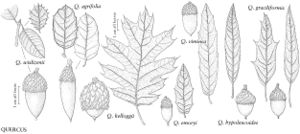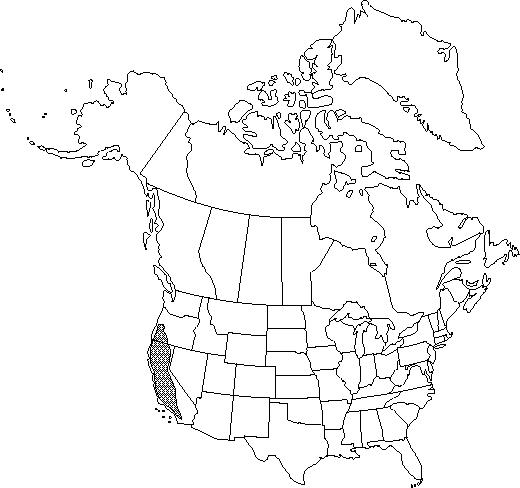Difference between revisions of "Quercus kelloggii"
Pacif. Railr. Rep. 6: 28, 89, fig. 6. 1859.
FNA>Volume Importer |
FNA>Volume Importer |
||
| Line 17: | Line 17: | ||
|basionyms= | |basionyms= | ||
|synonyms={{Treatment/ID/Synonym | |synonyms={{Treatment/ID/Synonym | ||
| − | |name= | + | |name=Quercus californica |
|authority=(Torrey) Cooper | |authority=(Torrey) Cooper | ||
| − | }}{{Treatment/ID/Synonym | + | }} {{Treatment/ID/Synonym |
| − | |name= | + | |name=Quercus tinctoria var. californica |
|authority=Torrey | |authority=Torrey | ||
}} | }} | ||
| Line 37: | Line 37: | ||
|elevation=300-2400 m | |elevation=300-2400 m | ||
|distribution=Calif.;Oreg. | |distribution=Calif.;Oreg. | ||
| − | |discussion=<p>The abundant crops of acorns from Quercus kelloggii were at one time an important food source for Native Americans.</p><!-- | + | |discussion=<p>The abundant crops of acorns from <i>Quercus kelloggii</i> were at one time an important food source for Native Americans.</p><!-- |
| − | --><p>The species reportedly hybridizes with Quercus agrifolia (= Q. ×ganderi C. B. Wolf) and Q. wislizenii (= Q. ×morehus Kellogg).</p> | + | --><p>The species reportedly hybridizes with <i>Quercus agrifolia</i> (= Q. ×ganderi C. B. Wolf) and <i>Q. wislizenii</i> (= Q. ×morehus Kellogg).</p> |
|tables= | |tables= | ||
|references= | |references= | ||
| Line 51: | Line 51: | ||
|rank=species | |rank=species | ||
|parent rank=section | |parent rank=section | ||
| − | |synonyms= | + | |synonyms=Quercus californica;Quercus tinctoria var. californica |
|basionyms= | |basionyms= | ||
|family=Fagaceae | |family=Fagaceae | ||
| Line 62: | Line 62: | ||
|publication year=1859 | |publication year=1859 | ||
|special status=Endemic;Selected by author to be illustrated | |special status=Endemic;Selected by author to be illustrated | ||
| − | |source xml=https://jpend@bitbucket.org/aafc-mbb/fna-data-curation.git/src/ | + | |source xml=https://jpend@bitbucket.org/aafc-mbb/fna-data-curation.git/src/8f726806613d60c220dc4493de13607dd3150896/coarse_grained_fna_xml/V3/V3_222.xml |
|genus=Quercus | |genus=Quercus | ||
|section=Quercus sect. Lobatae | |section=Quercus sect. Lobatae | ||
Revision as of 17:15, 18 September 2019
Trees, deciduous, to 25 m. Bark dark brown to black, ridges broad, irregular. Twigs brown to red-brown, (1.5-)2-3.5 mm diam., glabrate. Terminal buds chestnut brown, ovoid, 4-10 mm, glabrous or with scales ciliate on margins. Leaves: petiole 10-60 mm, glabrous to densely pubescent. Leaf blade ovate or broadly elliptic to obovate, 60-200 × 40-140 mm, base cordate to obtuse, occasionally rounded, margins with 7-11 lobes and 13-45 awns, lobes acute to distally expanded, separated by deep sinuses, apex acute; surfaces abaxially glabrous with small axillary tufts of tomentum to densely pubescent, adaxially glabrous to minutely pubescent, veins raised on both surfaces. Acorns biennial; cup saucer-shaped to deeply bowl-shaped, 13-27 mm high × 20-28 mm wide, covering 1/2-2/3 nut, outer surface glabrous to sparsely puberulent, inner surface 1/3 to completely pubescent, scales more than 4 mm long, attenuate or acuminate to acute, smooth, occasionally tuberculate near base of cup, tips loose, especially at margin of cup; nut oblong to broadly ellipsoid, 21-34 × 14-22 mm, puberulent, especially at apex, scar diam. 5.5-10.5 mm. 2n = 24.
Phenology: Flowering late spring.
Habitat: On slopes and valleys of hills and mountains
Elevation: 300-2400 m
Discussion
The abundant crops of acorns from Quercus kelloggii were at one time an important food source for Native Americans.
The species reportedly hybridizes with Quercus agrifolia (= Q. ×ganderi C. B. Wolf) and Q. wislizenii (= Q. ×morehus Kellogg).
Selected References
None.

